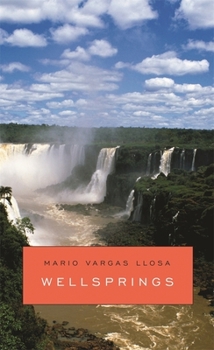Wellsprings
When a master novelist, essayist, and critic searches for the wellsprings of his own work, where does he turn? Mario Vargas Llosa--Peruvian writer, presidential contender, and public intellectual--answers this most personal question with elegant concision in this collection of essays. In "Four Centuries of Don Quixote," he revisits the quintessential Spanish novel--a fiction about fiction whose ebullient prose still questions the certainties...
Format:Hardcover
Language:English
ISBN:0674028368
ISBN13:9780674028364
Release Date:May 2008
Publisher:Harvard University Press
Length:208 Pages
Weight:0.60 lbs.
Dimensions:0.8" x 4.8" x 7.3"
Customer Reviews
2 ratings
Insightful and lively commentary on literature, Latin America, and liberalism by a master of modern
Published by Thriftbooks.com User , 14 years ago
Mario Vargas Llosa, one of the world's greatest living writers, is also well known, especially in Spain and Latin America, as a great defender of the ideals of a free society. In the Spanish-speaking world, he is therefore more than a great writer; he is also a public intellectual in the real sense of that much abused expression, and his regularly aired opinions on political events (as well as on literature, culture, and the arts) are a fixture of the intellectual life of these regions. His writing is always intelligent and urbane. Moreover, it is always informed by a definite classical-liberal point of view. Indeed, he may well be the most prominent expositor of this point of view in the Spanish language today. The first three chapters of WELLSPRINGS constitute the author's "Richard Ellmann Lectures in Modern Literature," delivered at Emory University in 2006. These lectures deal with "three masters" of Spanish letters: Miguel de Cervantes, Jorge Luis Borges, and José Ortega y Gasset. The chapters on Cervantes and Borges, perhaps predictably, deal with literary matters for the most part, but in the chapter on Ortega the stress is on political thought. Here Vargas Llosa adds what, to many, might seem an unexpected twist: he argues that this presently much-neglected Spanish philosopher should be regarded as a key figure in the development of the liberal tradition. To be sure, Ortega was not much interested in economic matters, and this omission was a shortcoming in his approach to social problems, but Vargas Llosa himself has often pointed out that classical liberalism includes much more than free-market economics. . . . In addition to the Ellmann Lectures, WELLSPRINGS includes four other chapters, which offer ruminations on nationalism, discussions of aspects of Latin American history, and (the last two chapters) commentaries on the writings of two thinkers who, according to Vargas Llosa, have had a profound and decisive influence on his own approach to politics: Isaiah Berlin and Karl Popper. This volume thus offers to the English-speaking public a distillation of Vargas Llosa's mature thought on political and social issues. The stress in the previous sentence should be on _mature_ because, given his current prominence as a spokesman for classical liberalism, it is easily forgotten that as a young writer he was a typical "man of the left." Indeed, like most intellectuals coming of age in the 1950s and early 1960s, he was closely identified with left-wing causes, and he greatly admired the Cuban Revolution. This stance was in part owing to the prevailing climate of opinion among intellectuals at the time, especially in France, where he spent his formative years as a struggling young writer. Another factor was a personality that has always exhibited a strong antiauthoritarian streak, along with the fact that authoritarianism in Latin America had historically long been associated with right-wing regimes. He eventually became convinced, however,
an intellectual tip of the iceberg
Published by Thriftbooks.com User , 16 years ago
I am a fan of many topics included in this book. A few years ago I tried to understand Hayek's 1944 hit, The Road to Serfdom, and I sympathize with the effort to stick to gradual progress as approved by Isaiah Berlin to avoid the forms of totalitarianism that dominated power politics in the twentieth century. The final chapter of Wellsprings explains the concepts that were key for Karl Popper in hoping for open societies and avoiding intellectual approaches like his book, The Poverty of Historicism. Revolutions become popular when everybody wants everything to be all different, and people in a superpower are unlikely to appreciate the desires of those who are considered the opposition. Karl Popper was born in Austria, and used words in ways that have not caught on, but Mario Vargas Llosa is an ideal wordsmith for putting the key concepts of open societies in a context that makes Karl Popper understandable.





